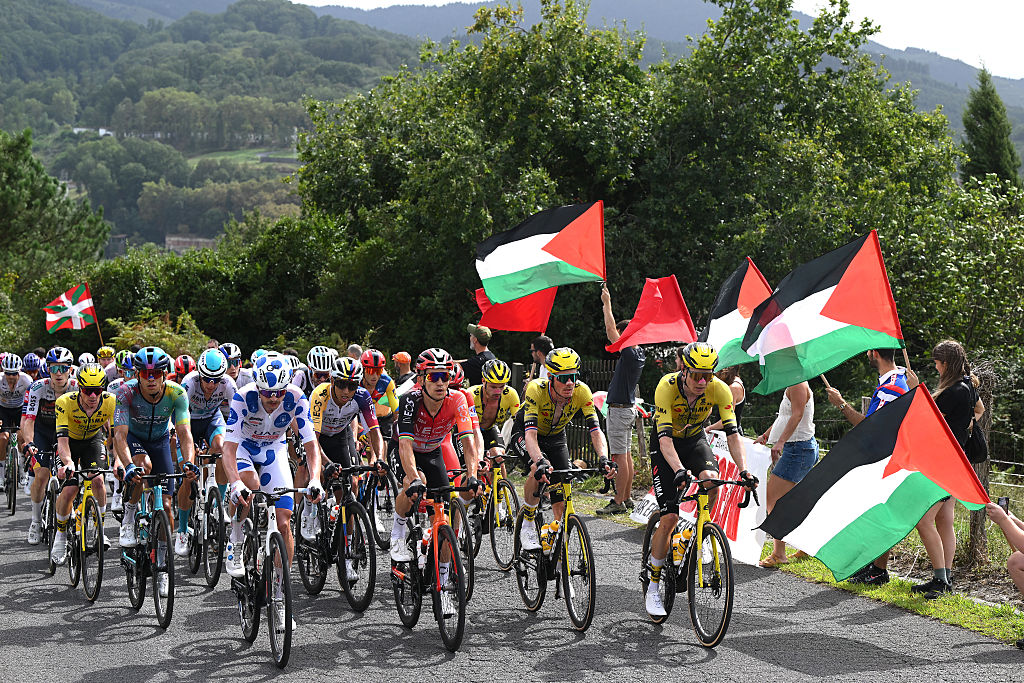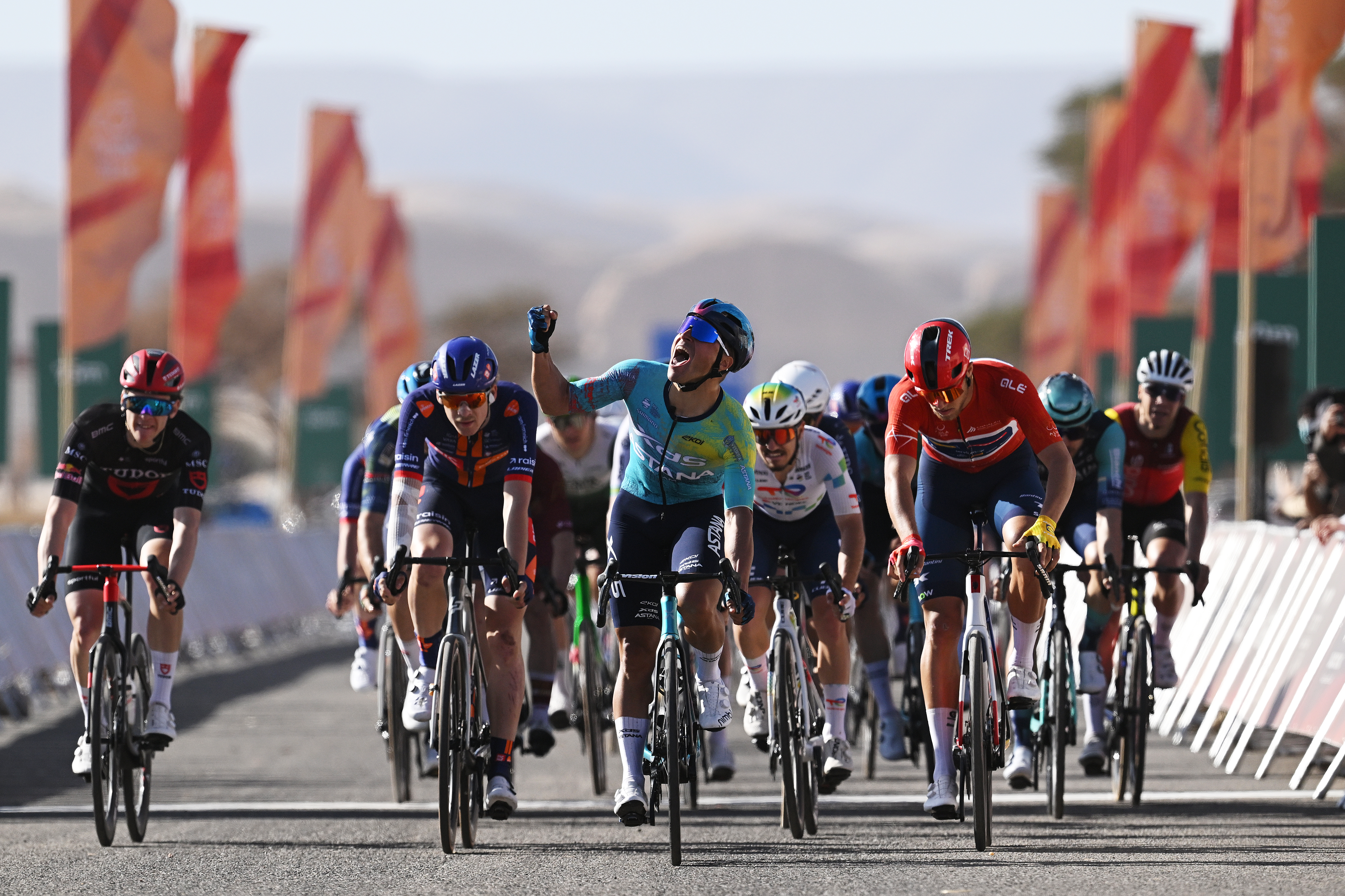'Next time it will only get worse' – Riders ask for solutions after Vuelta a España ends with protests and yet another stage cancellation
Michal Kwiatkowski vocal in criticism of handling of final stage in Madrid

After the final stage of the Vuelta a España was cancelled due to mass pro-Palestine protests in Madrid, riders including Michal Kwiatkowski (Ineos Grenadiers) have criticised the handling of the situation.
After three weeks of protests and several stages being disrupted, diverted or cancelled, the Vuelta attempted to continue to its finale in Madrid. The stage became untenable when thousands of protesters invaded the roads of the city centre circuit.
With police unable to control the situation, despite additional personnel drafted to the capital, stage 21 was called off before the riders reached Madrid, and the podium ceremonies cancelled. There were reports of violent clashes between police and protesters.
Despite the protests being well anticipated by the organisers and local authorities, the decision to stop was only made on the road, which prompted rider criticism.
"If the UCI and the responsible bodies couldn’t make the right decisions early enough, then long-term it’s very bad for cycling that the protesters managed to get what they wanted," Michal Kwiatkowski, one of the peloton's most experienced riders, wrote on Instagram.
"You can’t just pretend nothing is happening," he said.
The protests at the Vuelta, which are among the largest sport-related protests Europe has seen since the conflict began, have made headlines around the world, on publications from the BBC to The Washington Post as well as TV news.
The latest race content, interviews, features, reviews and expert buying guides, direct to your inbox!
They were even mentioned on the red carpet of the Emmys in Los Angeles on Sunday evening, as Spanish actor Javier Bardem affirmed his pro-Palestine position.
Due to widespread attention that the disruptive protests received, there is a fear that such acts will only increase at races to come, with activists now keenly aware that cycling events held on the open roads are particularly vulnerable to disruption.
"From now on, it’s clear for everyone that a cycling race can be used as an effective stage for protests and next time it will only get worse, because someone allowed it to happen and looked the other way," Kwiatkowski said.
He also criticised the late cancellation of the stage.
"It’s a shame for the fans who came here to watch a great event. Personally, I would have preferred to know in advance that the race was cancelled rather than being led to believe everything was going to be fine."
Kwiatkowski's post garnered support for other riders and figures in cycling, with Demi Vollering commenting "Well said" whilst other commenters accused the UCI of having their "head in the sand".
At the same time, many were supportive of the protests, praising the fact the conversation was continuing, with one commenter saying "La Vuelta is not the most important thing in the world. Unfortunately there are things bigger than this".
Overall winner Jonas Vingegaard and his team manager Richard Plugge also added their voices to the conversation on Sunday.
On the issue of Israel-Premier Tech's inclusion in races, organisers are obliged to invite the team as one of the top-ranked ProTeams, as mandated by the UCI.
Any change to that would have to come from the UCI, who traditionally follow the lead of the International Olympic Committee (IOC), who have not made any suggestion of banning or sanctioning Israeli teams.
Throughout the race, riders have offered varied opinions on the protests – from supportive of the right to protest, to critical of their actions – but the peloton has always been clear: whatever happens on the side of the road, they want to be able to race safely and unaffected by protests.
Many people protested at the Vuelta completely peacefully, with Palestine flags by the roadside every day, but on several occasions the protests purposefully disrupted the race, or demonstrators clashed with police.
There has been no official comment from the UCI after Sunday's events. It is not yet clear where professional cycling will go from here and how race organisers and governing bodies can avoid further disruption from activists in the final weeks of the 2025 season and in 2026, when the Tour de France is due to start in Barcelona, Spain.
Matilda is an NCTJ-qualified journalist based in the UK who joined Cyclingnews in March 2025. Prior to that, she worked as the Racing News Editor at GCN, and extensively as a freelancer contributing to Cyclingnews, Cycling Weekly, Velo, Rouleur, Escape Collective, Red Bull and more. She has reported from many of the biggest events on the calendar, including the Giro d'Italia, Tour de France Femmes, Tour of Flanders and Paris-Roubaix. She has particular experience and expertise in women's cycling, and women's sport in general. She is a graduate of modern languages and sports journalism.
You must confirm your public display name before commenting
Please logout and then login again, you will then be prompted to enter your display name.
